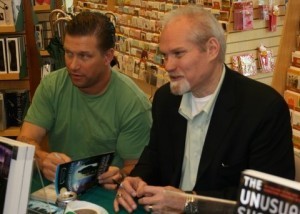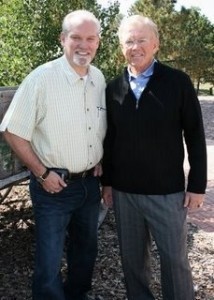Jerry B. Jenkins's Blog, page 36
November 19, 2011
Spotted Near My Writing Cave
Saw this one, spooked it with the camera, and it joined friends to escape. Can you spot six whitetails running off?[image error]
November 15, 2011
Giving the Reader Credit
Wednesday's Writing on Writing
I'll never be mistaken for a literary writer. When I am criticized, it is for pedestrian writing. Well, I am a pedestrian, and am proud to write for the pedestrian reader. If I were more intelligent, perhaps my writing would be deeper. I wish I were smart enough to write a book that's hard to read.
When I discuss theme, I'm not talking about the cosmic, overarching, universal, symbolic metaphors found in literary novels. Even mainstream fiction must have a theme. And in my mind, it should be clear to the average reader.
For example, in Though None Go With Me, my theme is the cost of true devotion to God. My main character is a woman born in 1900 who grows up with the Twentieth Century. In her early teens, she makes a decision to make the rest of her life an experiment in obedience to God.
Century. In her early teens, she makes a decision to make the rest of her life an experiment in obedience to God.
Almost instantly, she becomes a female Job, and her commitment affects her entire life. Anything that can go wrong, does. The questions become: Will she remain true to God? Is it worth it? Is there any payoff for that kind of a life, this side of heaven?If your reason for writing is to pontificate, for example, on the dangers of certain habits or lifestyles, you risk sounding preachy. I see this problem in many manuscripts: all talk, straw men, plots contrived to make a point, but little that grabs and subtly persuades the reader.
As you might imagine, preachiness is the bane of too much writing today, especially in the inspirational market.
We are trying to make the same kinds of points that preachers do. But no one complains that his preacher is too preachy. That would be like saying a ballerina is too dancy.
But preachiness on paper offends readers' sensibilities.
If you're like me, you like to be given some credit as a reader and thinker. Even as a child, when I heard the story of the boy who cried wolf, I got it. I didn't need someone saying, "So you see, Jerry, if you lie often enough, no one will take you seriously when you're telling the truth." The beauty of morality tales is that they make their own points.
Not even the greatest moralist ever explained His parables. In fact, when His disciples asked, in essence, what in the world He was talking about, He often said, "He who has ears to hear, let him hear." In other words, either you have spiritual insight or you don't.
November 8, 2011
Why Write?
Wednesday's Writing on Writing
I don't know why you write. I have only an idea of why I do. Most people are gifted in some area or another, having an innate knack for certain things.
At the risk of sounding falsely modest, I believe I've been given only one gift, and that is a knack for writing.
That doesn't mean I was brilliant at it and didn't need a lot of training and experience. In fact, I'm one who believes that no writer ever arrives.  I fear that if I'm not growing, I'm stagnating.
I fear that if I'm not growing, I'm stagnating.
So I read everything there is to read about the craft, listen carefully to colleagues and idols, and try to keep expanding my knowledge and learning.
While I had a bent toward certain sports, and some people think I am instinctively funny, writing is my only gift, and so I have felt compelled to use it. If I could also sing or dance or preach, I probably wouldn't write so much.
I've heard people say you should write only if you are compelled to or can't imagine yourself not writing. And I know people who seem to have that bent. They would write for free if they had to.
I have been asked when I knew I loved writing. I've never loved it. Writing is way too hard to love. What I really love is being a writer and having written.
Being a writer soon became what I wanted to do with my life. And though the work (the actual seat-in-chair writing) is hard and rarely fun, the more I do it, the better I get and the more writing muscles and tools I develop. And there is that rush at the end of a productive day that makes me look back on it as if it might have actually been fun.
Regardless why you write, keep doing it.
November 1, 2011
Writing as a Process of Discovery
Wednesday's Writing on Writing
About half the novelists I know are outliners, and half are not. Some need the safety net of an outline.  Some outline so completely that the writing becomes filling in the blanks, yet somehow it works.
Some outline so completely that the writing becomes filling in the blanks, yet somehow it works.
I prefer to write as a process of discovery.
I try to put interesting characters in difficult situations and write to find out what happens. If the story surprises and delights or shocks and scares me, it should have the same effect on the reader.
The last thing a novelist wants to be is predictable, and if you're not sure what's going to happen until it happens, the reader sure won't be either.
If a scene seems to stall, I remind myself that conflict is the soul of fiction. Say you write a conversation designed to give the reader important information. If it feels flat, have one character suddenly disagree or even insult the other.
"Of course you'd say that; that's the way you've always felt. If it were up to you, you'd let her get away with murder."
The other character is going to respond defensively, maybe with anger. And suddenly the scene is alive again.
Give your characters opposing goals or opinions, and let the consequences play out in your mind, recording them as you go.
How much better to follow the story than to contrive it.
Sometimes I make a note or two to remind myself to finish a thought or a puzzle so I don't wind up with loose ends, but that's as close as I come to an outline.
I began Left Behind with the line, "Rayford Steele's mind was on a woman he had never touched." I then immediately establish that he is piloting a 747, has a wife and kids, and yet is daydreaming about a possible affair. That's on the edge of risqué for a novel in the inspirational market, and while I did not pursue any graphic details, you can see how that juxtaposition alone gave the reader enough to stay curious — and seemed to help the novel succeed.
Above all, give the reader credit and let him figure some things out for himself.
Show, don't tell, but don't show everything.
A Hemingway novel begins with a woman cutting bread and a boy delivering the Paris Review on cobblestone streets. Papa H. didn't have to come right out and say where the story was set.
Avoid clunky exposition; strive for subtlety. And write as a process of discovery.
It's a lot of fun — like reading and writing at the same time.
October 30, 2011
Happy Halloween!
October 25, 2011
Don't ever apologize for…
Wednesday's Writing on Writing
…wanting to be published. You'd be amazed at how often I hear from would-be writers who say they just want to write for the sake of writing. "I don't care if it gets published." Then why not just talk?
Get your work out there. Sure, a certain amount of ego is at play. Who doesn't want to be known, to be successful, to see her name in print? You simply need to remember that publishing has to be a byproduct of your writing, not the end goal.
If you set out to glamorize yourself, write a bestseller, score, whatever you call it, you might enjoy a short-lived celebrity, but you won't have a career.  As Dean Koontz has taught, the purpose of writing is communication, and if what we write is not read, that purpose is not fulfilled.
As Dean Koontz has taught, the purpose of writing is communication, and if what we write is not read, that purpose is not fulfilled.
The most attractive quality in a person is humility. Sometimes money and fame will come whether or not you expect or seek them. But if you become enamored with the trappings of success, they become your passion. You need to return to your first love.
Why are you a writer?
Are you an inspirational writer?
The answers to those questions should have nothing to do with yourself. If God and others are not the reasons you write, you might as well write solely for the general market.
That doesn't mean everything you write has to be a sermon or packed with scripture, but your unique worldview should come through.
October 18, 2011
Don't Ask, Don't Ask
Wednesday's Writing on Writing
I used to make most of my living as a writer penning as-told-to-autobiographies of famous people. Early on in my season of working with people in demand, I established a policy: I would not ask them for anything other than what the publisher was paying them for.
They had already committed to giving me large blocks of uninterrupted time for interviews, and also shadowing time, when I just hung in the background and watched them interact with their families, teammates, the press, and colleagues. This helped me catch their natural voice, which was often different from their interview voice. (Above, with Stephen Baldwin after we'd worked together on a film.)
I noticed that almost all the other people in their lives had an agenda, something they wanted. People hinted at what they wanted, or came right out and asked for pictures, pennants, autographs, tickets, or even to have the celeb call a relative and wish him happy birthday. I decided I would not do that, and to my surprise, they noticed and appreciated it.
I asked for only their time, for which they were being handsomely paid, but I did not otherwise have my hand out, asking for or expecting anything. That helped when friends asked me to ask them for such things. I'd say, "You know what? I don't even ask for those things for myself or my sons."
 In almost every instance, at some point the person himself or a manager or agent would contact me and say, "I noticed you didn't ask for anything. Can we send you some pictures for your kids? Would you like a few tickets to a game?" Now it was time to gratefully accept. The last thing I wanted was to leave a memory of myself as just another
In almost every instance, at some point the person himself or a manager or agent would contact me and say, "I noticed you didn't ask for anything. Can we send you some pictures for your kids? Would you like a few tickets to a game?" Now it was time to gratefully accept. The last thing I wanted was to leave a memory of myself as just another
moocher.
If you find yourself in a similar situation, I recommend the don't ask, don't ask policy.
(Left, with former Washington Redskins coach and now NASCAR owner Joe Gibbs, while working together on a book.)
October 17, 2011
October 11, 2011
To Whom Are You Writing?
Wednesday's Writing on Writing
Experts agree you should write to a single audience. I say you should write to a single person at a time. That's why you'll never see wording like this in anything I write: "Many of you…" "But, folks…" "Ladies and gentlemen…"
[image error]No, rather, I'm writing just to you. There may be many people who can be addressed as "you," but that is relevant only to me, not to you. So, rather than saying, "Some of you are parents…" I would write, "You may be a parent…" because I'm not talking to anyone but you right now.
When I write a magazine column to readers roughly my mother's age and sharing her values, I imagine writing to her, though she passed more than a year ago.
When I write sports biographies, I write to people just like me: somewhat knowledgeable, rabid fans. So I imagine writing to myself, writing what I would want to read.
When I write on spiritual themes to a general audience, I must take that audience into consideration too. That doesn't mean I will be condescending or judgmental. It means I imagine a friend or loved one I respect and admire, but whom I know disagrees with me on the issues.
Know where your audience is coming from, imagine someone you know or know of who fits in that audience, and pretend you're writing to that person alone. When I find myself in territory I know is sensitive and has been the subject of criticism, skepticism, or even ridicule, it's vital that I let the reader know that I know. I might even write, "I'm not stupid; I know how this sounds. But hear me out."
Force yourself to write to one person at a time. It'll change how you word things. And you'll find it brings more power to each word.
October 7, 2011
12 Days Every Year…
…my brothers Jim, Jeoff, and I are one year apart in age and our brother Jay is ten years behind. When I turned 62 September 23, Jim was 64, Jeoff 63, and Jay 51.
October 4, Jim screws it all up every year, and as this year he hit the big 6-5, Jeoff and I and our wives drove to Michigan to surprise him. (Jay and his wife are missionaries to Senegal in West Africa, or they would have been there too.)
Below, left to right, are the birthday boy Jim, Jeoff, and yours truly.




